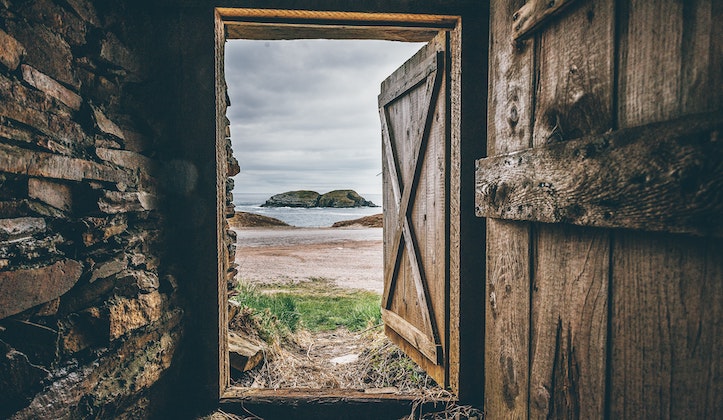We’re thrilled to offer a chance to read the full first chapter of The Lost Village by Camilla Sten, a new Swedish paranormal horror novel, on sale today!
Documentary filmmaker Alice Lindstedt has been obsessed with the vanishing residents of the old mining town, dubbed “The Lost Village,” since she was a little girl. In 1959, her grandmother’s entire family disappeared in this mysterious tragedy, and ever since, the unanswered questions surrounding the only two people who were left—a woman stoned to death in the town center and an abandoned newborn—have plagued her. She’s gathered a small crew of friends in the remote village to make a film about what really happened.
But there will be no turning back.
Not long after they’ve set up camp, mysterious things begin to happen. Equipment is destroyed. People go missing. As doubt breeds fear and their very minds begin to crack, one thing becomes startlingly clear to Alice:
They are not alone.
They’re looking for the truth… but what if it finds them first?
Read the full first chapter below!
TUESDAY
Now
I’m woken by a shrill crackling noise that takes me from dozing to a dazed wakefulness in the blink of an eye.
As I sit up and bat the sleep out of my eyes, I see Tone reach out and turn off the radio. The crackling immediately disappears, replaced by the dull hum of the engine and the pent-up silence of the van.
“What was that?” I ask, running my fingers through my hair.
“The radio’s been playing up for a few miles,” Tone says. “It jumped from dad rock to dance band, and then it just started crackling.”
“Must be the start of the dead zone,” I say, feeling a fizz of excitement in my belly.
I take my phone out of my pocket, realizing as I do that it’s much later than I’d thought.
“I still have signal, but only just,” I say. “I’ll post one last update before we lose it completely.”
I log in to Instagram and take a quick shot of the sun-drenched evening road ahead.
“How does this sound?” I ask. “Getting closer! Almost inside the dead zone. See you in five days, if the ghosts don’t get us . . .”
Tone grimaces.
“Might be a bit much,” she says.
“They’re gonna love it,” I say, clicking “post”. Then, after checking that it has shared to both Twitter and Facebook, I put the phone back in my pocket.
“Our fans eat that stuff up,” I go on. “Ghosts and horror films and shit. It’s our best USP.”
“Our fans,” Tone quips. “All eleven of them.”
I roll my eyes, but can’t deny that it hurts. The joke cuts a little too close to the bone.
Tone doesn’t notice. Her eyes are still fixed on the road. It’s empty and anonymous, a flat highway with neither bends nor turnings. Tall, impenetrable conifers enclose us on either side, and to our left the blazing sun drifts deeper into a bleeding sky that bathes us and the forest in its hue.
“The exit should be pretty soon,” she says. “We’re starting to get close.”
“Would you like me to take over?” I ask. “I didn’t mean to fall asleep. I don’t know what happened.”
Tone gives a tight, closed-mouth smile.
“If you were up till four a.m. going through everything then it isn’t such a surprise,” she says, without answering my question about taking over at the wheel.
I can’t tell if she means it as a dig or not.
“No,” I agree, “I guess not.”
Still, I am surprised. I’d thought that same tingling, feverish excitement that has kept me up the past few nights would prevent me from falling asleep here, too.
I cast a glance in the wing mirror and see the other white van that Emmy and the technician are driving immediately behind us. Max’s blue Volvo is just visible at the back of the caravan.
Is that excitement or anxiety I feel squirming inside me?
The intense light stains my white, cable-knit sweater a fiery red, and throws Tone’s face into a sharp silhouette. She’s one of those people who’s more beautiful in profile than front-on, with her enviably chiseled jawline and straight patrician nose. I’ve never seen her wearing any makeup, which makes me feel both ridiculous and exceptionally vain, especially as I’ve just had highlights put in to turn my naturally matte, wastewater hair into a cold, lustrous blond. This, despite it costing almost nine hundred kronor that I don’t have – not to mention the fact that I’m not even going to be in any of the footage we’re shooting over the next five days.
I did it for me. To settle my nerves. And we do need photos, I guess, for Instagram, Facebook, Twitter and the blog. To give our few – but enthusiastic – fans and backers something to whet their appetites, keep that fire burning.
I have a musty taste in my mouth after my nap. Eyeing up the plastic cup Tone got at the gas station in the cup holder, I ask:
“What’s in there?”
“Coke. Have some if you want,” she says, adding that it’s Zero before I can even ask.
I pick up the cup and take a few big gulps of the flat, tepid drink. It’s not particularly refreshing, but I’m thirstier than I thought.
“There,” says Tone suddenly, and slows down.
The old exit doesn’t exist on GPS, as we discovered when trying to plan our route. We’ve had to use old maps from the forties and fifties, cross-referencing them with the Swedish Transport Administration’s archive on where the train tracks used to run when trains still puffed their way up to the village twice a week. Max is good with maps, and he guaranteed us that this was where the road would be. But it’s only now, as Tone slows to a crawl to take the narrow, almost completely overgrown exit that was once the only road to the village, that I start to feel sure.
The van coasts along for a while and then comes to a halt. I look at Tone, thrown.
“What is it?” I ask.
She’s even paler than normal, her freckles glowing against her wan skin. Her small mouth looks like a dash across her face, and her hands are clenched tightly around the wheel.
“Tone?” I ask, quieter this time.

At first she says nothing, just sits there staring quietly into the trees.
“I just never thought I’d see it,” she says softly.
I put my hand on her arm. Under the lightweight fabric of her long-sleeved T-shirt, her muscles are coiled up tightly like springs.
“Would you like me to drive?” I ask.
By now the others have stopped, too. The second van is right behind us, with Max’s blue Volvo presumably bringing up the rear.
Tone lets go of the wheel and leans back slightly.
“Might be a good idea,” she says. And then, without looking at me, she undoes her seatbelt, opens the door, and jumps out.
I follow her lead: I unfasten my seatbelt, jump out of the van, and walk around to the other side. The outside air comes as a shock, clear and fresh and very cold. It cuts right through my thick sweater, even in the absence of any wind.
By the time I climb into the driver’s seat, Tone has already fastened her seatbelt. I wait for her to say something, but nothing comes. So I cautiously put my foot on the gas, and we pull off down the half-overgrown road.
An almost solemn silence descends on the car. Once we’re swallowed up by the trees, which seem to stoop down over us on the narrow road, the sound of Tone’s voice in the sudden semi-darkness makes me jump.
“Plus it’s only fitting that you should drive into the place. I mean, this is your project. You’re the one who wanted to come here. Right?”
I snatch a glance at her out of the corner of my eye, but try to keep my attention on maneuvering the unwieldy van over gnarled roots and stones.
“I guess,” I say.
It’s a good thing we went for the extra insurance with the rentals; this is definitely not the terrain these vans were made for. But we needed them to get all of our equipment up here, and the cross-country vehicles were so eye-wateringly expensive that just one day’s rental would have blown our budget several times over.
We drive on in silence. As the minutes pass and we go deeper and deeper into the forest, it hits me just how isolated this small community must have been. From what grandma said, only some of the villagers had a car, so the train was their only real connection to civilization, and that only ran twice a week. If it’s taken us this long to get here in our vans, it must have been a completely different world when the only option for getting out of town was to walk this entire stretch.
We drive past a small track that winds off into the forest. At first I wonder if I’ve missed a turning, but then I realize it must be the road that led to the mine. I carry on ahead, inching over undergrowth and fallen branches. The van grumbles and moans, but battles on.
Just when I start to worry that we’ve gotten it wrong – that this was just a forest path, a walking trail, and that we’ll keep on driving further and further into the forest, until we get mired in the weight of our vans and equipment, our stupidity and ambition – the trees open up like a miracle before our eyes.
“There,” I whisper, more to myself than to Tone.
It buoys me enough to speed up a little, just a little, and I feel the blood pumping through my veins as the fiery April sky swells before us.
We exit the forest onto a steep bank. And there it is, at the bottom of a valley that isn’t so much a valley as a slight depression in the ground.
The church looms large over the small buildings on the eastern side of the village, its tall, proud spire topped by a slender cross that glistens, impossibly bright, in the light of the setting sun. The houses look almost as if they’ve sprouted from the church like little mushrooms, falling and moldering to form walls and silhouettes along the coppery-red river running down to the small woodland lake that gave the village its name: silvertjärn, silver tarn. It may well have been silver at one point, but now it sits, glossy and black, like an aged secret. The mining company’s report stated that the lake had never been searched, nor had they been able to find any information on its depth. For all we know it could stretch all the way down to the groundwater. Bottomless.
Almost instinctively I undo my seatbelt, open the door, jump down onto the soft, wet spring topsoil, and look out over the village. It’s completely silent. The only sounds to be heard are the low, ever-present hum of the engine, and the wind’s soft sighs as it sweeps down over the village.
I hear Tone clamber out of the driver’s door behind me. She doesn’t say a word, doesn’t even close the door behind her.
I exhale – a prayer, an incantation – a welcome:
“Silvertjärn.”
Then
Elsa is on her way home from Agneta Lindberg’s house when she realizes something isn’t right.
The walk should take only fifteen minutes at a brisk pace, but rarely does Elsa make it home in under forty, so many people there are who want to stop for a chat.
Elsa has been visiting Agneta every week for the past few months, ever since the poor dear got the news. Elsa normally sees her on a Wednesday, as it’s so convenient to pop by after one of the pharmacist’s wife’s Wednesday lunches.
Nothing much ever gets done at those lunches; in essence they’re just a chance for some of the village ladies to get together and chew the fat, sip coffee from dainty little cups, and feel a fleeting sense of superiority. But it’s all harmless fun, and goodness knows the women of Silvertjärn feel all the better for having something to do. Elsa can’t deny that even she enjoys these sessions, although sometimes she does have to put her foot down when their chitchat becomes a little too barbed.
Insinuations about the paternity of the schoolmaster’s youngest child won’t do anyone any good. Elsa herself had been to visit him and his poor wife when the boy was refusing to take the breast, and she has rarely seen a father more doting – however red that boy’s hair might be.
It’s a hot afternoon, unusually close for April, and as Elsa walks she can feel herself start to perspire beneath her blouse. She likes to take the path down by the river’s edge; it’s nice and even underfoot, and if you look up you can see the lake shimmering in the distance. The meltwater has started to stream and ripple below the riverbank, and it’s enough to make you want to stop for a paddle.
Not that Elsa does that, of course. How it would look if she were to pull up her skirt and start splashing around, like a little girl without a care in the world? That really would give the village women something to gossip about!
It’s when Elsa smiles at this thought that it first strikes her that something is off, for when she looks around to see who might catch her would-be frolics in the river, she realizes that no one is there.
The river is lined with houses. It’s the old heart of Silvertjärn, and Elsa has a soft spot for this part of the village. When she and Staffan first moved to Silvertjärn, back when she was scarce more than a child herself, they had lived in one of the new buildings the mine had constructed. It had been a cold, soulless place, and Elsa is convinced that those cracked white walls were the reason why her first pregnancy was so difficult. She had made sure that they had moved away as soon as they could.
The houses down here by the river are older, with more personality, and Elsa knows everyone who lives down this way. Without boasting or bluster, Elsa can honestly claim to know everyone in Silvertjärn, but the area between the church and the river is her own, which means she goes the extra mile for those who live here. She likes to pass by the house with the sloping roof on the corner, to say hello to Pia Etterström and her twin boys; to stop outside Emil Snäll’s porch and ask how his gout is treating him; to pause to admire Lise-Marie’s rosebushes.
But today not one person has stopped or waved.
Despite the warm weather, there’s not a soul to be seen in gardens or out on front steps, and not a single window is open. No one has bustled outside to say hello after seeing Elsa pass, even though she can see movements behind the kitchen curtains and closed windows. Everyone seems to have locked themselves away.
Her stomach turns.
In days to come, Elsa will wonder if some part of her already knows – before she sets off into a run, before she gets home, sweaty and disheveled, to find Staffan sitting at the kitchen table, his face empty with shock.
But no, she doesn’t know. She hasn’t realized, hasn’t guessed. She could never have guessed.
So when Staffan says with the voice of a sleepwalker:
“They’re shutting down the mine, Elsie. We found out today. They sent us all home.”
. . . she faints on the spot for the first and only time in her life.



